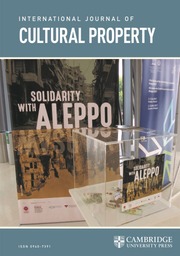Article contents
Cultural Heritage Development in China: A Contextualized Trajectory or a Global–Local Nexus?
Published online by Cambridge University Press: 20 July 2016
Abstract:
This article investigates China’s heritage development from an evolutionary perspective. On the one hand, by situating the reception of the cultural heritage concept in a socio-cultural construct dimension, it reveals the unique dialogism between the two divergent epistemological paradigms of wenwu (cultural relics) and wenhua yichan (cultural heritage) that underline heritage appropriation and practice in China. On the other hand, it examines China’s cultural heritage development in relation to society, arguing that considerations of national heritage, though influenced by the international environment, are still largely determined by its national socio-cultural, economic, and political settings. The evolutionary approach reveals the way in which China’s heritage vision and practice are negotiated according to international forces and societal imperatives, implicating issues such as commodification and reconstruction in the debate of heritage conservation, which is relevant to, among others, the research on heritage tourism and urban development in contemporary China.
- Type
- Research Article
- Information
- Copyright
- Copyright © International Cultural Property Society 2016
References
REFERENCES
- 7
- Cited by


